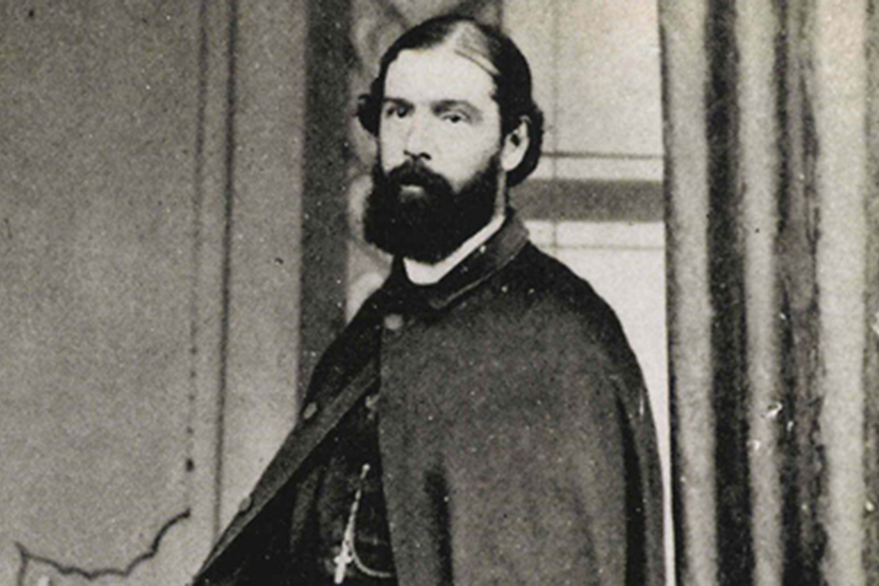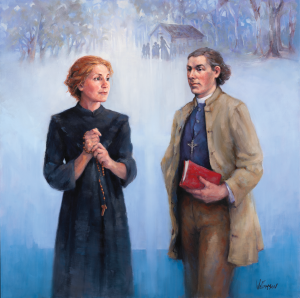
Joy and Suffering
One of the greatest joys I have experienced through the Josephite charism is the beauty of relationship between Mary MacKillop and Father Julian Tenison Woods. Jan Williamson captured it wonderfully in her painting The Vision. But joy and suffering often go together.
I remember suffering when I first learned of Mary and Fr Julian’s estrangement. That luminous Vision of them both suddenly felt like a naïve fairytale. The realisation shook my confidence in the goodness of the charism. Feelings arose like those I had experienced as a young adult when my parents each explained to me how they were considering separating from one another. My response was fearful denial. I didn’t want to believe it could happen in our family. Thankfully, it didn’t. But the experience revealed the difference between a beatific vision of my family and the reality.

A Saint and Spiritual Mother
The saints can hold those two things, the vision and reality, together. Time and time again we see Mary and Fr Julian entering the grubby arena of Australian life and dragging it a step closer to the Kingdom of God. Each of those acts in and of itself was a window into that glorious Kingdom. Perhaps one of Mary’s greatest acts was her loving authorship of Fr Julian’s biography, the act of a loving friend and devoted spiritual mother who could see her children’s need to know the goodness of their spiritual father.
A Spiritual Father’s Ecology
As a spiritual father, Fr Julian continues to be a source of God’s grace for the Josephite mission. Today many look to him for an authentic Catholic ecology, a way of being in and understanding our common home – Earth. His view of it was both reverent and well ordered.
Fr Julian, while reverent of the natural world, did not mistake it for God. To him, its beauty was ‘insipid’ compared to its Creator. With the Church, he viewed nature as objectively beautiful and awesome but ultimately without thought or will. He was aware that nature is contingent, caused by something else, the result of a wilful, uncaused cause. Something supernatural. God.
Fr Julian recognised humility as the beginning of wisdom – a right ordering of humanity in relation to God. He envisioned poor and humble sisters fostering great faith in the providence of God. This right relationship with God brought the Sisters into right relationship with one another. The Sisters became a community capable of sustaining God’s mission to the poor and through their prayer and service they proclaimed Christ and created a common home for Australians.
On his missions, Fr Julian let Christ restore right order through word and sacrament. The Bread and the Word of Life lifted people’s hearts. Their suffering was united with Christ’s as a noble sacrifice of love for others. When Fr Julian proclaimed Christ crucified and risen from the dead, he proclaimed that the infinite and finite, the supernatural and natural, the uncaused and caused, joy and suffering, could coexist in humanity – fully divine and fully human. That is Joyful.
The Ecology of the Joyful Gospel
Christ is worthy of people’s worship, of being attended to and imitated. Christ, properly ordered to God his father, restored our relationship with him, restoring us to right relationship with one another, heralding a new common home – the Kingdom of God. As ecology deals with the relations of organisms to one another and to their physical surroundings, Christ is the highest principle of ecology.
This Gospel explains the number of people who would trek into remote towns like Honeywood (modern-day Geeveston, southern Tasmania) when Fr Julian came missioning. They came because his missions restored them to right relationship with God, renewed their relationships with family and community and renewed their common home. The One he proclaimed was worthy of their attention of their sacrifice. Many a woman found purpose as Sisters of Saint Joseph in response.
Concluding thoughts
The estrangement of Fr Julian and Mary cast a shadow. But there is little doubt that Christ’s love, alive in Mary, restored right relationship between her and Fr Julian. Holding him up as Father Founder, they together proclaimed the reconciling ecology of Christ. An ecology Christ is working in the Josephites (formerly brown and black) and the faithful of Australia. An ecology Australia, and the rest of our common home are desperate for. On the anniversary of Father Founder’s death (7 October), let us rise and imitate his proclamation of the ecology of Christ. And let us live with the right order of our Spiritual Mother: God, our fellow sinners in the church, and our common home; the world and all its peoples.
St Joseph and St Mary of the Cross,
Pray for us.
Daniel de la Motte
Education Officer
Josephite Mission and History Centre, Hobart, Tasmania
